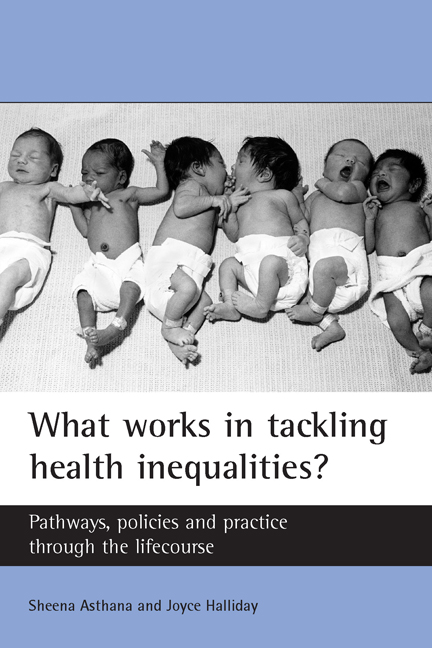Book contents
- Frontmatter
- Dedication
- Contents
- List of tables, boxes and figure
- Acknowledgements
- List of abbreviations
- one Introduction
- Part 1 The research and policy context of health inequalities
- Part 2 Health inequalities pathways, policies and practice through the lifecourse
- Part 3 Tackling health inequalities: developing an evidence base for public health
- Index
one - Introduction
Published online by Cambridge University Press: 14 January 2022
- Frontmatter
- Dedication
- Contents
- List of tables, boxes and figure
- Acknowledgements
- List of abbreviations
- one Introduction
- Part 1 The research and policy context of health inequalities
- Part 2 Health inequalities pathways, policies and practice through the lifecourse
- Part 3 Tackling health inequalities: developing an evidence base for public health
- Index
Summary
Tackling health inequalities has become a key policy objective in the UK in recent years. While the 1980 Black Report received international attention but had a limited impact on national policy, the 1998 Acheson Independent Inquiry into Inequalities in Health has stimulated a wide-ranging policy response. For the first time ever, health inequalities have been made a priority for the National Health Service (NHS). Indeed, the principle that the “NHS will help keep people healthy and work to reduce health inequalities” was established as one of the service's 10 core principles in the Labour government's NHS Plan (DH, 2000).
The extent to which the British government will succeed in these goals rests on a number of factors including a sufficient understanding of the causes of health inequalities, a well-founded knowledge of the policies and interventions that can effectively address those causes and a political will to invest in those policies. Amid continued uncertainty about how the broad policy recommendations that arise from health inequalities research should be translated into practice and about the specific health outcomes of many NHS and socio-economic interventions, these three issues are the focus of this book.
One key area of uncertainty concerns the role of local-level initiatives. Many propose that health inequalities can only be addressed through a significant redistribution of income or wealth. This does appear in the government's agenda through tax and benefit reform. However, as evidenced by the emphasis on area-based initiatives and the expected role of primary care trusts, local authority bodies and community groups in taking forward the public health agenda, health inequality policies are primarily targeted at local areas. One aim of this book is to examine what this means in practice. Given what we know about the causes of health inequalities, what can local policy makers, practitioners and agencies do to narrow the health gap between the most and least deprived groups? What evidence exists about the potential impact of local initiatives on health outcomes and what factors shape the effectiveness of such interventions? Can local agencies be given clearer advice about the best ways to respond to the government’s health inequalities agenda? Indeed, is it possible to overcome uncertainty about the effectiveness of the government's strategy?
- Type
- Chapter
- Information
- What Works in Tackling Health Inequalities?Pathways, Policies and Practice through the Lifecourse, pp. 1 - 18Publisher: Bristol University PressPrint publication year: 2006



